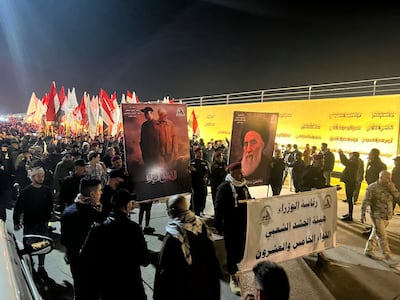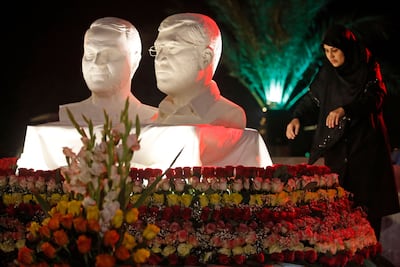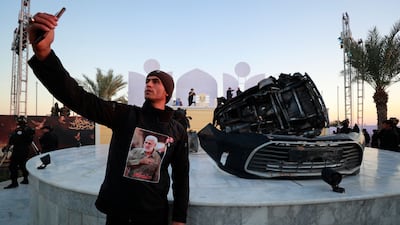Iraqi Shiite leaders gathered in Baghdad, to mark the third anniversary of the assassination of one of Iran’s generals and a senior Iraqi militia leader in a US drone strike that heightened fears of military escalation in the region.
Qassem Suleimani, commander of Iran's Islamic Revolutionary Guard Corps' elite Quds Force, was killed at Baghdad International Airport on January 3, 2020, on the order of former US President Donald Trump.
Suleimani was hailed as a hero in Iran and described as brave, charismatic and beloved by the troops.
Abu Mahdi Al Muhandis, deputy head of Iraq's Iran-backed Popular Mobilisation Forces, was also killed in the attack.
On Monday evening, thousands of mourners joined Iraqi officials in a rally near the airport in Baghdad.
The killings escalated took the US and Iran to the brink of war.
Officials in the capital unveiled a statue of Suleimani and Al Muhandis near the airport as mourners held up posters bearing images of the dead men.

Candles were lit by mourners as others waved Iraqi and Iranian flags.
Although the Iraqi parliament denied that Tuesday is an official holiday, the provinces of Baghdad, Basra, Wasit, Dhi Qar, Muthanna and Diwaniyah in the south announced an official day off to mark the occasion.
It is expected that other Shiite majority provinces will join in and suspend official working hours. However, northern provinces with a Sunni majority have ignored the anniversary.
Across Iraq, many analysts said support for Iran has plummeted following a violent response to a Shiite-led protest movement, which left at least 500 Iraqis dead in October 2019.
Iran-backed parties, including those linked to Al Muhandis, fared poorly in the last election in 2021, although they gained the majority of seats after their main rival, Shiite cleric Moqtada Al Sadr, withdrew his MPs from parliament, claiming Iran-linked groups were undermining his election gains.
Protesters in 2019 were calling for employment opportunities and better public services and were threatened with a crackdown by Al Muhandis, who accused them of working for foreign powers.
Before that, Al Muhandis and Suleimani were accused by the US, UN and EU of orchestrating the kidnapping and killing of thousands of Sunnis during Iraq's civil strife after the US-led invasion, and during the later war on ISIS.
Iraqi militia leaders, such as Iranian-backed militia chief Hadi Al Amiri and Asaib Ahl Al Haq’s Qais Khazali, called for an end to the US presence in their country.
Former Iraqi prime minister Adel Abdul Mahdi visited the grave of Al Muhandis in the southern Shiite holy city of Najaf on Sunday.
His grave has become a focus for Shiites vowing vengeance against the US. Al Muhandis was leader of Iran-backed Iraqi militia Kataib Hezbollah.
He was Suleimani’s top Iraqi aide and widely seen as Tehran’s man in Baghdad.

Iran responds to Suleimani death
Iran’s Foreign Minister Hossein Amirabdollahian pledged on Monday to continue working to achieve “justice against the perpetrators of the American assassination”.
Mr Amirabdollahian said Iran would work with Iraq on the investigation.
“All the documents have been completed. However, the last documents we need are the acceptance and official declaration from the Iraqi government that Gen Suleimani was an official guest of Iraq,” he said.
Suleimani was responsible for Iran's foreign operations and frequently shuttled between Iraq, Lebanon and Syria.
Videos circulated on social media that showed young Iranians burning a billboard of Suleimani on a motorway in Tehran and tearing down the placards of the general.
Iranian President Ebrahim Raisi said on Tuesday that revenge for the killing is “certain”.
“We have not forgotten and will not forget the blood of martyr Soleimani, and let them know that revenge for the blood of martyr Suleimani is certain,” Mr Raisi said in a televised speech.
Senior Iranian leaders, including supreme leader Ali Khamenei, have repeatedly said they would “never forget” the killing, while confirming that their government is keen to avenge his death.
“We will never forget the martyrdom of Suleimani … We have said something about [avenging Suleimani], and we stand by that word. It will be done in its own time, in its own place, God willing,” Mr Khamenei said.
In southern Beirut a march, organised by Palestinian groups holding Palestinian flags, attracted a few hundred people, who closed down one part of the road as they marched towards a statute of Suleimani.
One person carried a wreath, others held banners with Suleimani’s face emblazoned on them while some wore shirts with his face drawn on.
They were accompanied by dozens of children in a marching band.
Hassan Nasrallah, leader of the Iran-backed Hezbollah in Lebanon whose forces have long worked with Soleimani and the IRGC, also addressed the anniversary on Tuesday.
Mr Nasrallah, speaking with a croaky voice after contracting the flu, lauded “two great leaders”. He praised Soleimani for “facing and confronting US projects in the region”.
Additional reporting by Jamie Prentis from Beirut


